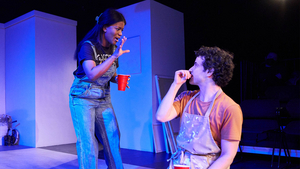Review: WHITE at Definition Theatre Company
James Ijames's WHITE is a sharp and genuinely funny critique of the modern art world.
 WHITE is a sharp and genuinely funny critique of the modern art world, the subjectivity of contemporary art, and the question of who should be represented and who has access to the upper echelons of said art world.
WHITE is a sharp and genuinely funny critique of the modern art world, the subjectivity of contemporary art, and the question of who should be represented and who has access to the upper echelons of said art world.
James Ijames's play opens by introducing us to Jane Forsyth, a curator at the fictional Parnell Museum in Chicago (clearly a send-up of the Museum of Contemporary Art). As played by Carley Cornelius, Jane is a delicious caricature of an art museum curator - she speaks like a grown-up sorority sister, eager to show off her knowledge but delivering each and every word with an extra air of pretension and a little more explanation than is needed at any moment. Cornelius's mannerisms are spot on in each scene. When Jane's friend Gus (Niko Kourtis) asks if she might consider him for a spot in her "New America" show, she's quick to deny him entry - Jane states that she wants the show to represent just what the title says and is only considering artists of color. Given that Jane herself is a white woman, Ijames sets up some interesting tension then and there.
Frustrated by that answer, Gus decides to hire an actor friend of his partner Tanner (Jonathan Allsop) to play the role of the artist behind his pieces. Together, Gus and Vanessa (Kierra Bunch) devise the fictional Balkonae, a Black female artist, to pose as the woman behind Gus's art so that he might gain entry into the show. As you might imagine, though, Gus quickly loses grip on his scheme and realizes that he might be biting off more than he can chew.
Ijames's satirical and biting text not only opens up questions about the intersections of race and contemporary art, but it also skewers the notion of contemporary art itself. Gus's paintings are no more than white paint on white canvases (a send-up, as well, to the play's title), yet both he and Jane become convinced that they're magnificent works of art. But Jane only becomes truly interested in the works when she's led to believe that Balkonae painted them. Thus, Ijames also poses the question about whether modern art can live in a vacuum: Can we ever consider works of art separate from the artists, and are the artists themselves part of the performance of that art?
Director Ericka Ratcliff's production moves swiftly, and each member of the ensemble nails every line and milks every moment for maximum humor - and oftentimes, maximum (and justified) discomfort. Kourtis makes Gus affable, even as his blindspots are obvious. He and Allsop have a genuine rapport that makes us believe in them as a couple, but Allsop also demonstrates that Tanner isn't willing to let all of Gus's plans and selfishness slide. Bunch easily and compellingly shifts between her multiple roles. In addition to her roles as Vanessa and Balkonae, she makes a hilarious turn as St. Diana (as in Ross), who appears before Gus.
WHITE satirizes the modern art world and Ijames isn't afraid to bring attention to the inherent biases within that world, but it also sheds light on the fact that what is and is not worthy contemporary art is a gray area.
Definition Theatre Company's production of WHITE plays in the 1700 Theatre at Steppenwolf Theatre Company through April 10. Tickets are $20-$40. Visit steppenwolf.org.
Photo Credit: Joe Mazza
Review by Rachel Weinberg
Reader Reviews
Videos

